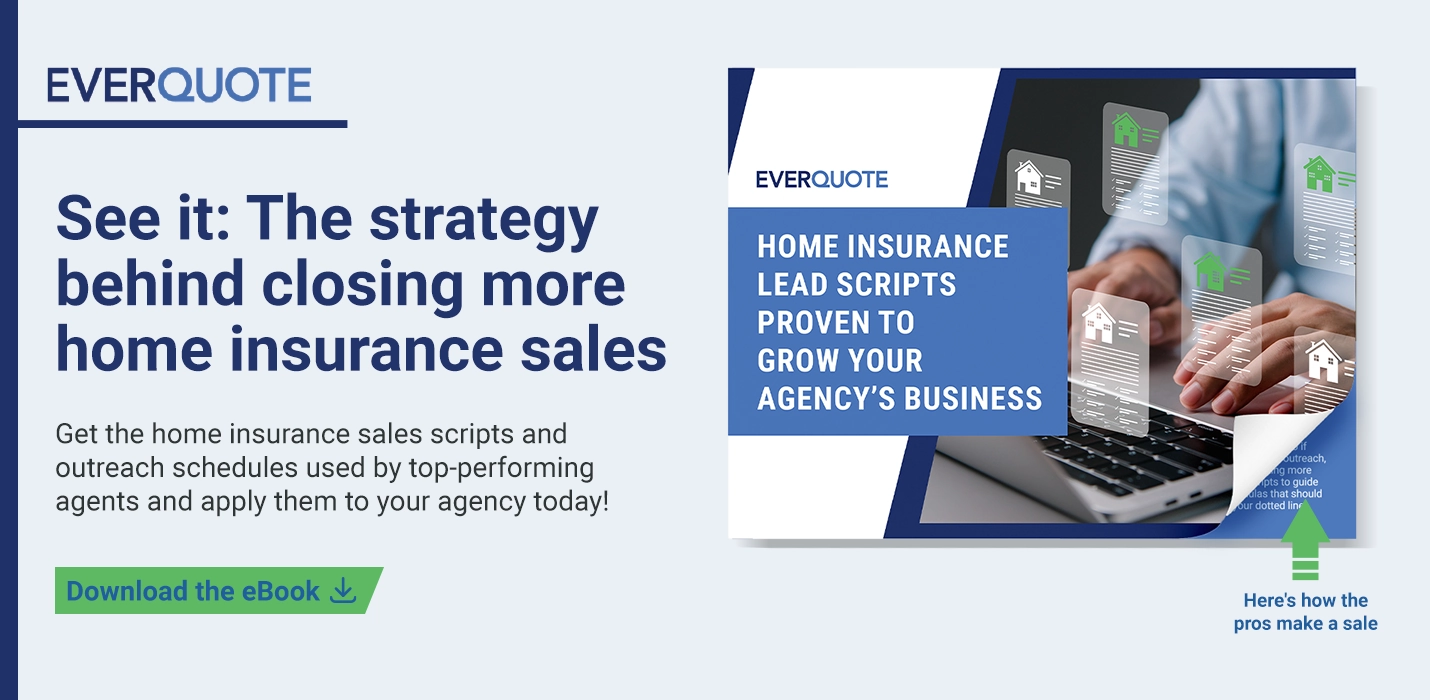- Home»
- EverQuote Pro Blog»
- Launch Your New Insurance Agency With This Business Plan Template
Launch Your New Insurance Agency With This Business Plan Template

Whether you're a brand new agent or one with several decades of experience, the idea of opening a new insurance agency probably seems daunting—where do you start?
One of the first things you’ll need to do is come up with a business plan for your insurance agency. After all, you can walk into a bank or a potential investor’s office looking for funding, but you won’t get very far unless you have a robust insurance agency business plan that proves you’re on the right track toward turning a profit in the near future.
Follow the steps below when building out your insurance business plan to maximize your chances of securing funding and getting your new agency off to a strong start.
7 Steps To Build Your Insurance Agency Business Plan
1. Develop your executive and business summaries.
In business plan terms, the executive summary is the driving force behind your other decisions. It should explain why you’re starting your agency. The business summary is similar, but it should narrow down your “why” into a list of “hows.”
Ask yourself:
- Why do you want to open an agency?
- What types of insurance do you wish to sell?
- What do you hope to accomplish?
- What return on investment do you expect to receive?
- How are you going to generate demand and ensure supply for your service?
Jot your answers down so you can refer back to them as you move forward.
2. Decide whether you want to be a captive agent or an independent agent.
Many large agencies, such as Allstate and Farmers, work with captive agents who can only sell insurance for that specific provider. Independent agents, on the other hand, can sell insurance for multiple providers, but they get locked out of working with the big-name captive carriers who only work with captive agents. (Read more about captive agents here and get a seasoned agent’s POV on both types of agents here.)
Before you can nail down the details of the rest of your business plan, you’ll have to make a choice between these two options.
3. Do a market analysis.
Though it might seem like a tedious process, conducting a thorough market analysis is crucial to your success. Analyzing your local market—including the backgrounds, shopping behaviors, and preferences of your target customers—gives you the insights you’ll need to attract these folks to your business.
Your market analysis will look a little different depending on whether you prefer to be a captive or an independent agent. The state you live in is another factor that will affect your analysis—in fact, it may even influence your decision to be captive or independent.
Take a close look at the demographics of your region.
- How many homeowners live in your state?
- What’s the average insurance premium per home?
- How many people live in each home, on average?
- How many drivers live in your state?
- How many vehicles does the average household own?
- Do you live in an area with an aging population?
- How many families live in your region?
- What insurance carriers do locals in your state gravitate toward?
- In your area, what might be some successful strategies for retaining clients (rather than just acquiring them)?
These questions are all important, but pay particular attention to the last one. If you open an agency without a plan for client retention, you’re going to struggle. And, unfortunately, this is one of the most overlooked aspects of an insurance agency business plan.
4. Identify where you’ll find your first clients.
It’s one thing to know there are X number of potential clients living in your state, but it’s quite another to have a plan that will help you reach out to those folks and land your first policy sales.
Some investors will require a list of leads before they’ll even consider funding your agency. Even if it’s not a requirement, it’s always a good idea to have a pipeline ready to go. This is where getting set-up for purchasing warm leads from EverQuote can put you in a great position for success.
Plus, tackling this step before you even open your doors will help you better understand the costs you’ll incur—and therefore how much startup funding you will need.
You might also consider other options, such as placing ads in local newspapers, going to networking events, investing in digital marketing, sponsoring local Little League teams, or asking for referrals.
5. Create a financial plan.
Many new agencies fail because their owners overlooked something critical during startup. Do your best to look at your financial plans from every angle:
- Where will you find leads, and how much will they cost?
- What is your advertising budget?
- Does this budget line up with the going rates of local newspapers, billboards, or online ads?
- Do you plan to have 1099 employees or W2 employees selling insurance for your agency?
- How will you decide on a commission and benefits structure for these employees?
- What retention and loss ratios (for clients and employees) do you expect based on the numbers of other agencies in your area?
- How will you handle the delay between policy renewals and income hitting your bank account?
- If there are X amount of people shopping for insurance in your area, what percentage of those people are in a niche you can serve?
- From that percentage of potential clients, how many do you think you can successfully land?
- If you sell policies to these customers, how much will you earn from their premiums?
- How do your projected profits compare to your expected advertising costs, the cost to buy leads, office rent, and other expenses?
Take detailed notes of your calculations, and try to run the numbers a few different ways to obtain a conservative outcome, a likely outcome, and a “best case scenario.”
6. Draw up a formal business plan using a proven format.
Your notes will be incredibly valuable as you move forward, but you’ll need a way to present them clearly and concisely in a way that looks attractive to investors.
Loan officers and investors don’t want to read long-form essays detailing your business background and your ideas for the future. Keep your format simple and straightforward, with clear sections that answer the questions investors will want to know.
We recommend a format similar to the following:
Executive Summary
- Overall mission
- Primary objectives
- Keys to success
- Financial plans
- Profit forecast for at least three years
Business Summary
- Business overview
- Summary of startup costs
- Funding you’ll require
- Company executives/ownership
Services
- Services you provide
Market Analysis
- Overall business analysis
- Details of your competition
- Buying patterns of your competition
- Your planned buying patterns
- Market segmentation and analysis
- Target market strategies
- Include details for each market segment
Strategy
- Your competitive edge
- Marketing strategy
- Sales strategy
- Yearly sales projections
- Key milestones
Management
- Your plan for finding staff
Financial Plan
- Funding you have accepted
- Funding you will need
- Detailed startup costs
- Calculations for your break-even point
- Projected profit
- Yearly profit
- Gross and net yearly profit
- Anticipated losses, if any
- Cash flow patterns
- Plans for balance sheet
- Calculations of important business ratios
7. Revise and adjust your plan over time.
You may not secure funding for your agency immediately. Even if you do, you’ll likely find that your real world numbers don’t match up exactly with your calculated projections. Plus, carriers frequently change their underwriting policies, and the economy itself is always in a state of flux.
Keep your business plan current by updating the information anytime circumstances change.
Start your journey with a full lead pipeline from EverQuote.
One of the scariest parts about starting a new agency is not being certain where and when you’ll be able to start making sales.
Skip the fear and the unknown and go right to making sales with warm real-time leads from EverQuote. Whether you’re still trying to find startup funding or your doors are already open, you can always boost your business and maximize your chances of a steady income by working with EverQuote.
Unlock predictable growth with EverQuote.
Our representatives are standing by to help you succeed.
Call 844-707-8800
Weekdays, 9AM-5PM (ET)
Call 844-707-8800
Weekdays, 9AM-5PM (ET)
Accelerate your growth.
Complete the form below or just call 844-707-8800 to learn how we can help you achieve your goals.
By clicking "Get Started", I consent by electronic signature to being contacted by EverQuote, including by automatic telephone dialing and/or an artificial or prerecorded voice (including SMS and MMS - charges may apply), regarding EverQuote for Agents, even if my phone number is listed on a Do Not Call Registry. I also understand that my agreement to be contacted is not a condition of purchasing any goods or services, and that I may call (844) 707-8800 to speak with someone about EverQuote for Agents.
By clicking "Get Started", I affirm that I have read and agree to this website’s Privacy Policy and Terms of Use, including the arbitration provision and the E-SIGN Consent.
* Mandatory fields
 Product Overview
Product Overview Blog
Blog FAQs
FAQs Webinars
Webinars eBooks & Resources
eBooks & Resources